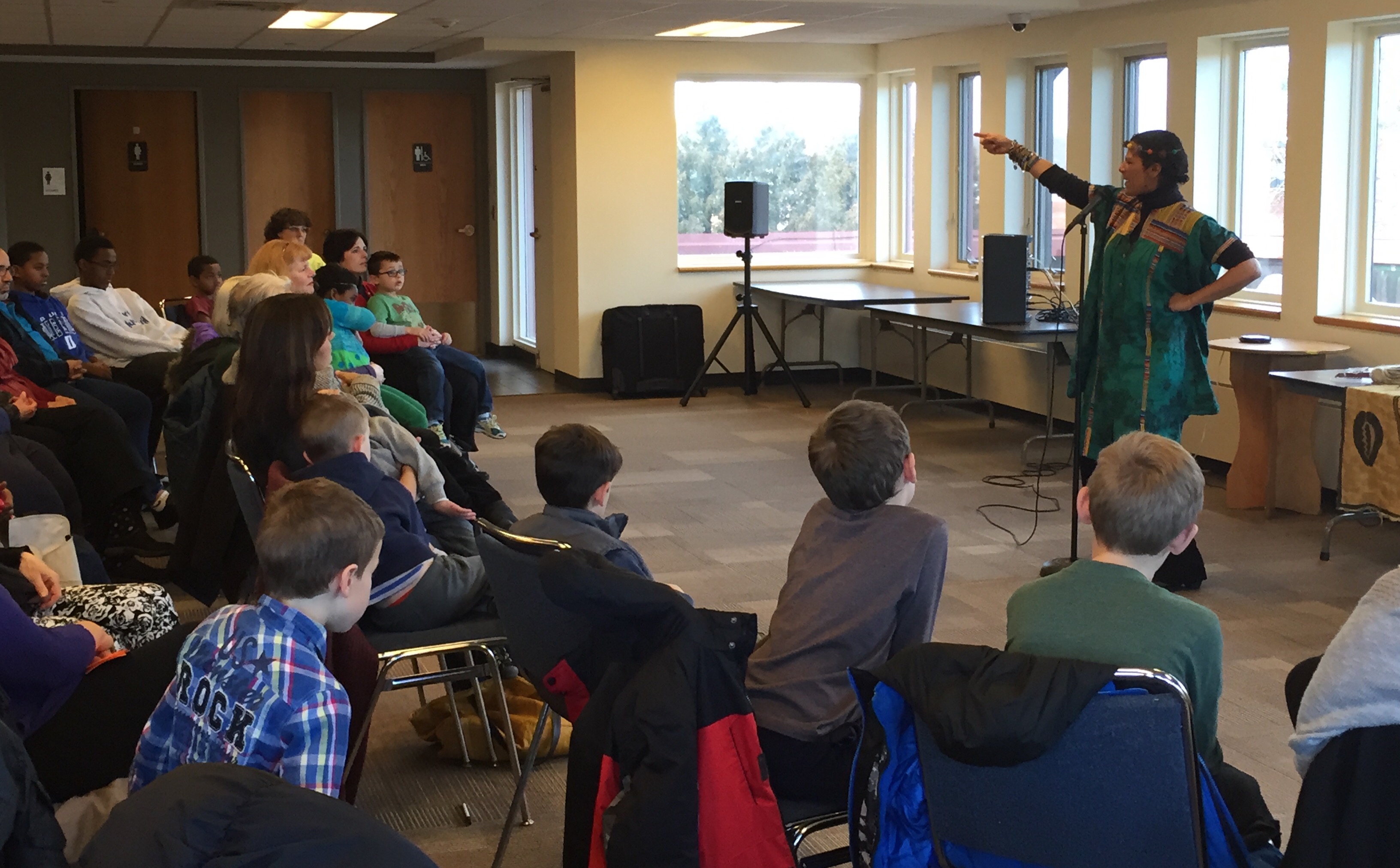New grants support community art in Rhode Island
Providence’s WaterFire, with its floating bonfires that light up the city’s riverfront, has become a cultural icon in the state. Since the event began in 1994, WaterFire officials estimate that it generates over $100 million dollars each year. Nearly $10 million dollars of that money is...
Providence’s WaterFire, with its floating bonfires that light up the city’s riverfront, has become a cultural icon in the state. Since the event began in 1994, WaterFire officials estimate that it generates over $100 million dollars each year. Nearly $10 million dollars of that money is tax revenue for the state. In recent years, state officials have continued to support similar arts programs.
 In 2014, voters approved $35 million state dollars for renovating and restoring cultural landmarks. About $30 million dollars of that money has already been divided to support Rhode Island icons, like the Stadium Theatre in Woonsocket. The theatre received over $2 million dollars in the initial round of grants, and is using that money to build a new conservatory, complete with studio space and a black box theatre.
But approximately $6.5 million dollars of the grant money has been designated for smaller arts organizations across the state. Last fall, interested groups applied for their own piece of that money, and the winners of those grants were just announced on Monday.
In 2014, voters approved $35 million state dollars for renovating and restoring cultural landmarks. About $30 million dollars of that money has already been divided to support Rhode Island icons, like the Stadium Theatre in Woonsocket. The theatre received over $2 million dollars in the initial round of grants, and is using that money to build a new conservatory, complete with studio space and a black box theatre.
But approximately $6.5 million dollars of the grant money has been designated for smaller arts organizations across the state. Last fall, interested groups applied for their own piece of that money, and the winners of those grants were just announced on Monday.
 The Southside Cultural Center in Providence just received one of the largest donations — $450,000 for renovating their historic facilities. The renovations include a new elevator shaft, and more handicap access to the the theatre space, once home to Rhode Island’s famous Trinity Repertory Company.
As work begins on the building, groups that use the center today hope to continue their work in the arts. Diverse organizations like Rhode Island Latino Arts, the Providence Improvisation Guild, and the Cambodian Society are all housed within the center. One of these groups, the Rhode Island Black Storytellers, has been celebrating black culture in the community for the last 18 years. The group has been based out of the Southside Cultural Center since its beginning, and currently hosts a slew of events, like a monthly potluck on Wednesdays. They had an event at the Westerly Public Library over the weekend to kick off their annual celebration of Martin Luther King, Jr. Day.
This is Valerie Tutson, the director of the Black Storytellers. Over the weekend, she greeted an audience of about forty people with a traditional Malawi welcome. Valerie has been with the Storytellers since it first began nearly two decades ago in her friend’s kitchen. And ever since then, she has been sharing her knowledge of black culture through paintings, stories, and songs, like the traditional greeting you heard before. As one of the major leaders of the group, she says she’s excited that their facilities will finally have room to grow.
The Southside Cultural Center in Providence just received one of the largest donations — $450,000 for renovating their historic facilities. The renovations include a new elevator shaft, and more handicap access to the the theatre space, once home to Rhode Island’s famous Trinity Repertory Company.
As work begins on the building, groups that use the center today hope to continue their work in the arts. Diverse organizations like Rhode Island Latino Arts, the Providence Improvisation Guild, and the Cambodian Society are all housed within the center. One of these groups, the Rhode Island Black Storytellers, has been celebrating black culture in the community for the last 18 years. The group has been based out of the Southside Cultural Center since its beginning, and currently hosts a slew of events, like a monthly potluck on Wednesdays. They had an event at the Westerly Public Library over the weekend to kick off their annual celebration of Martin Luther King, Jr. Day.
This is Valerie Tutson, the director of the Black Storytellers. Over the weekend, she greeted an audience of about forty people with a traditional Malawi welcome. Valerie has been with the Storytellers since it first began nearly two decades ago in her friend’s kitchen. And ever since then, she has been sharing her knowledge of black culture through paintings, stories, and songs, like the traditional greeting you heard before. As one of the major leaders of the group, she says she’s excited that their facilities will finally have room to grow.
 “We chose to be in the Southside Cultural Center because we really want to help support the cultural revival of that neighborhood,” Valeria said.
“The building has long been a cultural arts center. Trinity Rep started there long ago, and there have been other incarnations of different groups that have come through but we’re thrilled that there’s support, now. I’m involved with the board, and the advisory board, and have been working to really help get more folks involved so that we can continue to get the building up to speed, and get more and more people in and out.”
And if you do go to the cultural center to see the Storytellers, it’s likely you’ll encounter one of their liveliest performers. James McBride, a Rhode Island native, has been writing informative, motivational rap music under the persona “Mr Deep Positivity” for the last fourteen years. He has been sharing his talents with the Storytellers since he began rapping. At the event this weekend, James performed a song about Dr King.
“We chose to be in the Southside Cultural Center because we really want to help support the cultural revival of that neighborhood,” Valeria said.
“The building has long been a cultural arts center. Trinity Rep started there long ago, and there have been other incarnations of different groups that have come through but we’re thrilled that there’s support, now. I’m involved with the board, and the advisory board, and have been working to really help get more folks involved so that we can continue to get the building up to speed, and get more and more people in and out.”
And if you do go to the cultural center to see the Storytellers, it’s likely you’ll encounter one of their liveliest performers. James McBride, a Rhode Island native, has been writing informative, motivational rap music under the persona “Mr Deep Positivity” for the last fourteen years. He has been sharing his talents with the Storytellers since he began rapping. At the event this weekend, James performed a song about Dr King.
 McBride’s clean rhymes were a favorite at this weekend’s event. His innovative work is just one example of the Black Storytellers’ projects.This week, the Storytellers will be holding the Funda Festival, their annual, week-long celebration of black culture featuring nationally-renowned storytellers and artists. And as their space in the Southside Cultural Center begins to improve, the Storytellers say they look forward to expanding their programming.
With the new grant money, other institutions across the state, like the Greenwich Odeum and the Contemporary Theatre Company in Wakefield, will be expanding their facilities in the hopes of bringing in more people. Larger crowds at these venues could help boost Rhode Island’s economy.
“When you go to see a show, you go out to dinner beforehand, you go out for drinks afterwards, you park your car in a garage, all of that adds significantly to economic development ” said Randall Rosenbaum, the director of the State Council on the Arts, which gave out the new round of grants, along with the Rhode Island Historical Preservation Commission.
“And if you’re speaking on behalf of the state in general, people are coming from Connecticut and Massachusetts, they take hotel rooms, they spend a couple days, they enjoy the arts, and culture, and historic preservation, as well as the beaches and things along those lines, and they’re all contributing to the economy.”
Randall says he’s confident that the grants will help strengthen the state’s economy, though it’s too early to assess the impact. But groups like the Rhode Island Black Storytellers remind us that funding for the arts isn’t just about increasing state revenue.
This story was reported and produced by Justin Champeau.
McBride’s clean rhymes were a favorite at this weekend’s event. His innovative work is just one example of the Black Storytellers’ projects.This week, the Storytellers will be holding the Funda Festival, their annual, week-long celebration of black culture featuring nationally-renowned storytellers and artists. And as their space in the Southside Cultural Center begins to improve, the Storytellers say they look forward to expanding their programming.
With the new grant money, other institutions across the state, like the Greenwich Odeum and the Contemporary Theatre Company in Wakefield, will be expanding their facilities in the hopes of bringing in more people. Larger crowds at these venues could help boost Rhode Island’s economy.
“When you go to see a show, you go out to dinner beforehand, you go out for drinks afterwards, you park your car in a garage, all of that adds significantly to economic development ” said Randall Rosenbaum, the director of the State Council on the Arts, which gave out the new round of grants, along with the Rhode Island Historical Preservation Commission.
“And if you’re speaking on behalf of the state in general, people are coming from Connecticut and Massachusetts, they take hotel rooms, they spend a couple days, they enjoy the arts, and culture, and historic preservation, as well as the beaches and things along those lines, and they’re all contributing to the economy.”
Randall says he’s confident that the grants will help strengthen the state’s economy, though it’s too early to assess the impact. But groups like the Rhode Island Black Storytellers remind us that funding for the arts isn’t just about increasing state revenue.
This story was reported and produced by Justin Champeau.

Credit: Liz West

Romana Cass-Kolobe, one of the Founders of the Rhode Island Black Storytellers , engages an audience.

Valerie Tutson, one of the founders of the Rhode Island Black Storytellers, leads a program. Credit: Justin Champeu.

James McBride engages a little audience member at a Rhode Black Storytellers event. Credit: Justin Champeu

